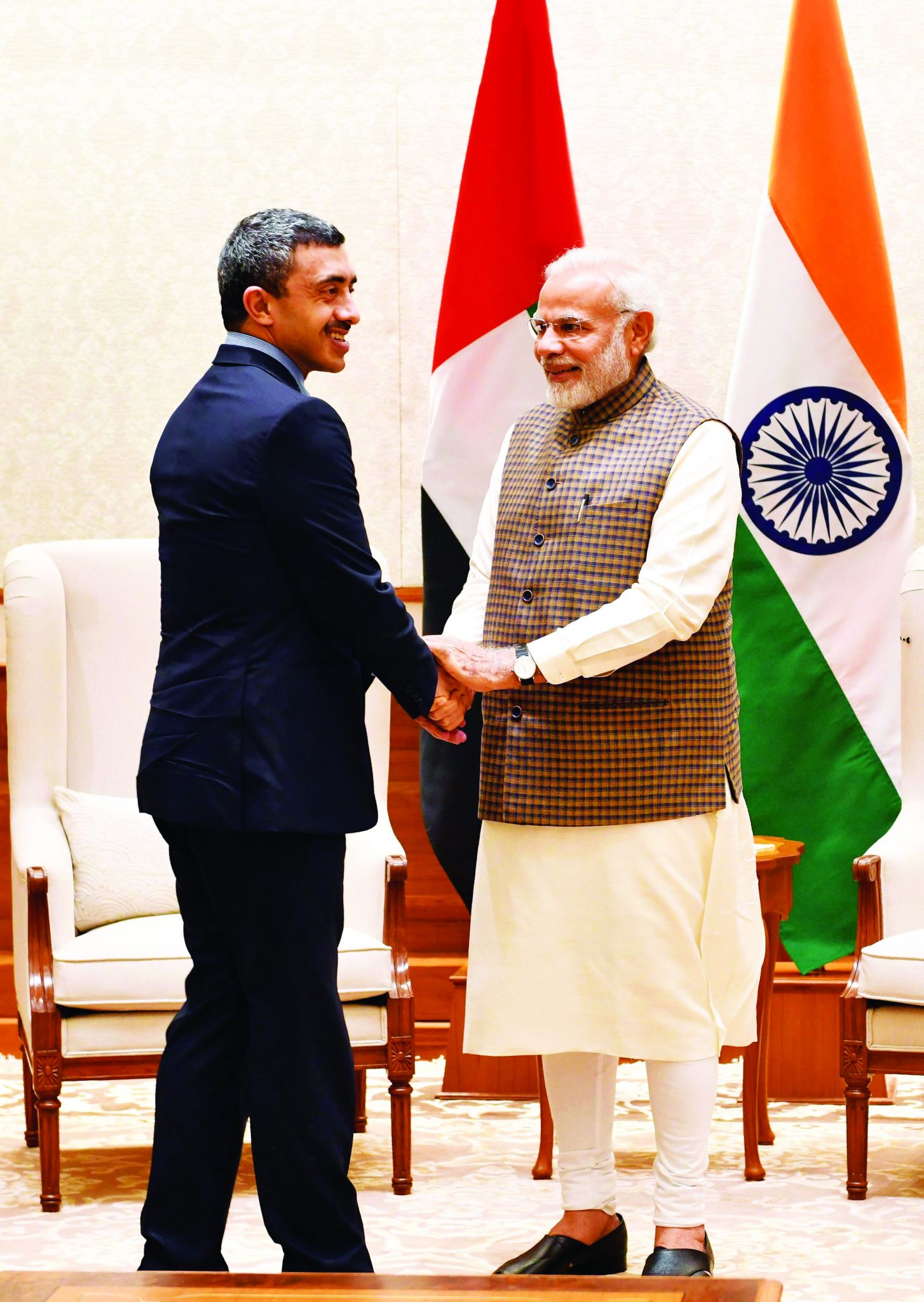
The India-UAE bilateral ties have touched an all-time high. The landmark visit of Prime Minister Narendra Modi to the UAE in August 2015 and the return visit of Abu Dhabi Crown Prince Sheikh Mohammed bin Zayed Al Nahyan in February 2016 have set momentum for enhancing the bilateral relations to a strategic partnership. Modi is the first Indian leader to visit the UAE in more than three decades. During this visit, the UAE pledged to invest $75 billion in India.
Then, the visit of Sheikh Mohammed to India as the chief guest for the Republic Day parade in January 2017, and Prime Minister Modi’s second visit to the UAE as part of his Gulf tour in February this year emphasized the importance given to each other by both countries.
When Modi arrived in Abu Dhabi from Jordan on the second leg of his three-nation Gulf tour this year, the Crown Prince and other members of the royal family received him at the airport. “We warmly welcome our state guest and valued friend, the Indian Prime Minister H.E.@narendramodi to the UAE. His visit reflects our longstanding historical ties and is testament to our friendly bilateral relationship,” the Crown Prince tweeted. Various buildings in Abu Dhabi were lit up in the Indian tricolor as the city was decked up to welcome Prime Minister Modi.
Natural Partners
While seeking to enhance economic engagement and deepen security cooperation with the Gulf, India has found a willing partner in the UAE, which is grappling with security concerns emanating from turmoil in West Asia and growing threat from terrorism and extremism. Both countries consider each other as natural partners.
The Economic Times reported that security and economic ties between the two countries have deepened since Modi’s 2015 visit to the UAE and Sheikh Mohammed’s participation as the chief guest at India’s Republic Day parade. Modi broke all protocol to greet him at the airport. India and the UAE signed several bilateral agreements.
According to a report in Khaleej Times in February 2016, India and the UAE signed agreements on cyber security, infrastructure investment and insurance during Sheikh Mohammed’s visit to New Delhi. Sheikh Mohammed and Modi deliberated extensively on combating the threat of terrorism, and explored ways to enhance bilateral cooperation in counter-terrorism, maritime security and defence, the newspaper reported.
Strategic Partnership
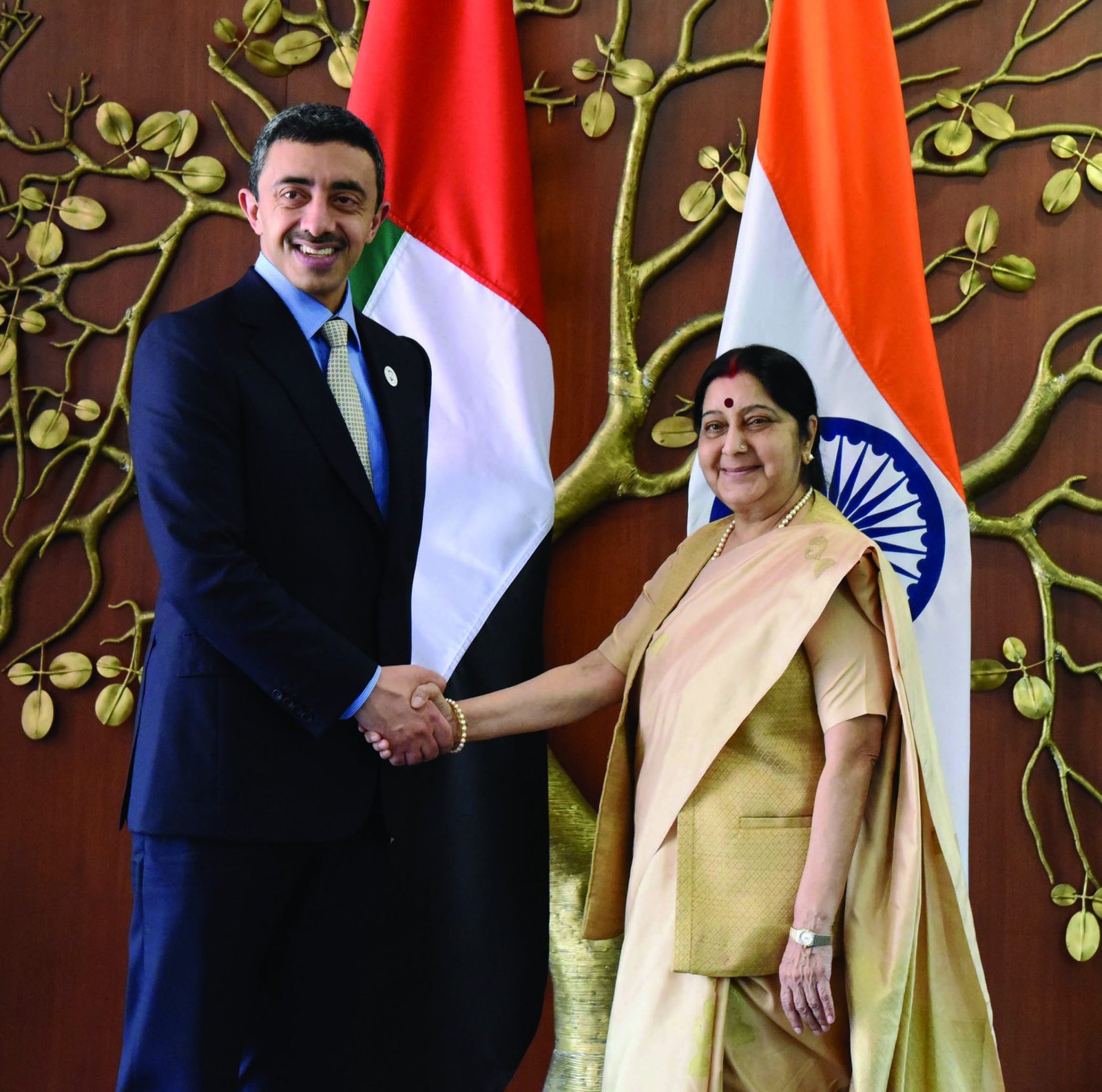
During Modi’s 2015 visit, it was security where the most progress was made. Both countries agreed to elevate the relationship to a comprehensive strategic partnership. During Sheikh Mohammed’s February 2016 visit to India, both sides finalised and signed a framework agreement. The deal to elevate the bilateral relations to a comprehensive strategic partnership was signed by Sheikh Mohammed and Modi. Indian ambassador to the UAE Navdeep Singh Suri praised India’s relationship with the UAE as the golden era.
“Prime Minister Narendra Modi’s second visit to the UAE is an indication of the special importance we attach to the India-UAE relationship,” Suri said. “We have seen major UAE investments into India, a significant increase in defence and security cooperation, a transformation in our energy ties from a buyer-seller relationship to a strategic partnership.” Suri said.
The UAE’s ambassador to India, Ahmed Al-Banna, said the bilateral visits tell “us the direction that India and the UAE have in mind.” He said, “The leadership has put us on a challenging and interesting track where the relationship is very important, on many sectors, and our leaders are pushing to rewrite future plans for both nations.” He also emphasised the connectivity aspect of the bilateral ties.
“There are 1,076 flights a week between India and the UAE, which is the largest operation of its kind. More than 50 per cent of Indians, who travel outside India to different destinations, such as Europe or America, use Dubai and Abu Dhabi as their transit hub,” he said.
Indians make up the UAE’s largest expatriate community with an estimated 2.6 million citizens in the country. Indian migrant workers sent back 14.64 billion Emirati dirhams during the second quarter of 2017-18, which translates to more than Rs 25 billion.
Turmoil in Middle East
Modi and Sheikh Mohammed have established a personal rapport and share a vision for a huge jump in economic co-operation, said Prasad Nallapati, president of the Centre for Asia-Africa Policy Research. “The Middle East has been in turmoil, particularly since Donald Trump took over as president of the United States,” Nallapati said. “Iran’s growing arc of influence from Iraq to Lebanon has been a major headache for Saudi Arabia and the UAE. The two countries formed a military alliance to fight the Iran-backed Houthi rebel group in Yemen. Qatar became a new enemy, effectively demolishing the Gulf Cooperation Council (GCC). The US decision to recognise Jerusalem as the capital of Israel and move its embassy there from Tel Aviv created further complications in the region.”
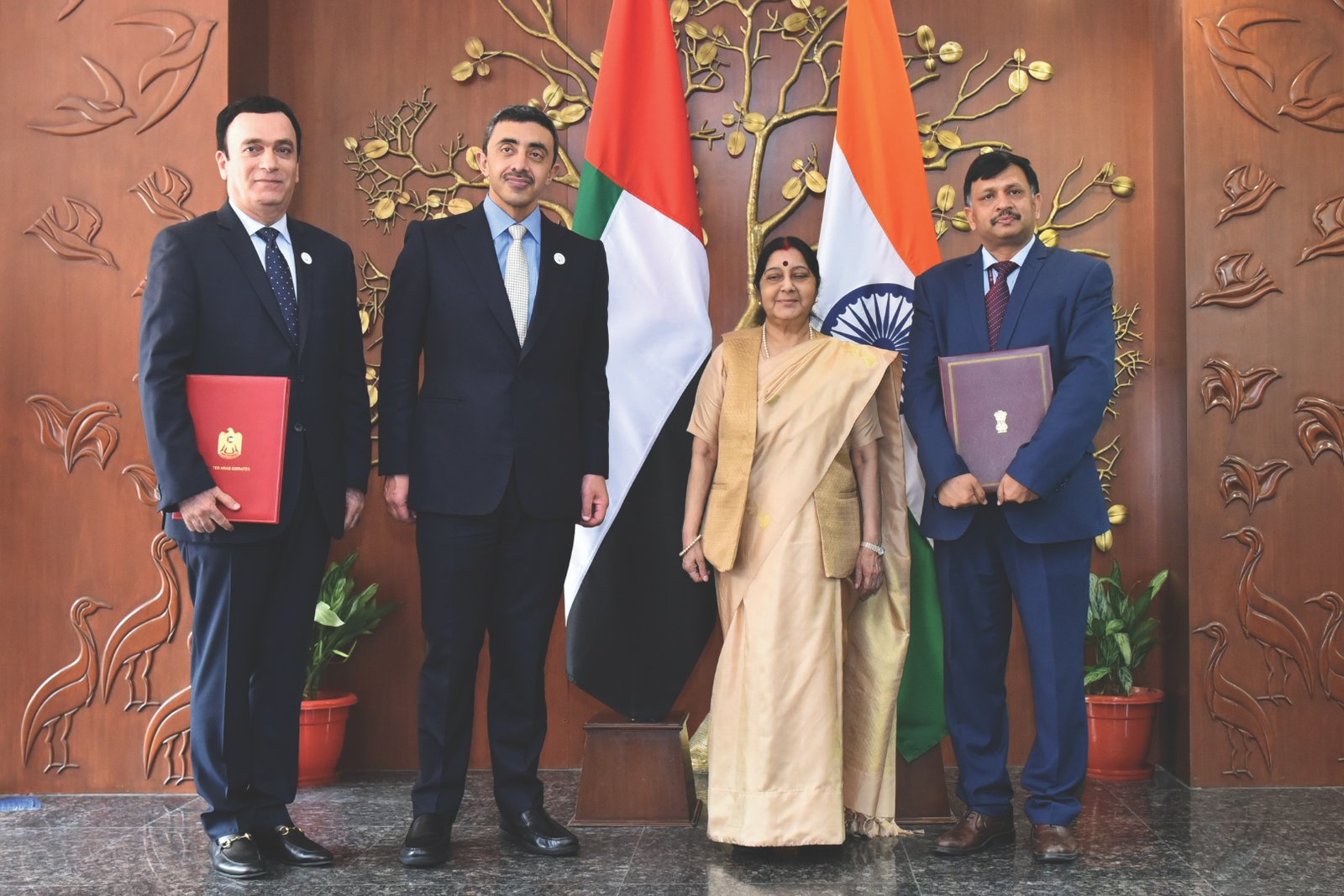
Dr Ebtesam Al Ketbi, president of the Emirates Policy Centre, a think-tank based in Abu Dhabi, told Khaleej Times that the visit will enhance joint ventures between both nations in various sectors.
“This visit reflects how the UAE is important for India. It also indicates the UAE is an attractive model. India is a rising power in Asia and it is important for the UAE to have a strong partnership with India.
“I think this visit will see the strategic partnership between two countries flourishing in various sectors. The UAE leadership is going in the right direction by diversifying their partnership with other countries,” Dr. Al Ketbi said.
Top Trading Partners
India and the UAE are each other’s top trading partners with annual bilateral trade of around $50 billion in 2015 and 2016. The UAE is one of the biggest sources of foreign direct investment in India and contributes significantly to its energy security. It was the fifth-largest supplier of crude oil to India in 2015 and 2016. The latest industry estimates project an increase in bilateral trade that outstrips the official target, with direct and indirect trade touching $100 billion by 2020.
NRI-Emirati Investors Group, a consortium of UAE-based private investors, has said it will raise $1 billion for a fund that will finance infrastructure projects in India, the biggest local private fund-raising effort of its kind.
“This would be the largest such collective fund raising programme by a private group of investors generating as much $1 billion for investment into big-ticket Indian projects and reflects the level of maturity of the UAE’s private sector businesses,” said Vipul, the consul general of India.
“This also reflects the fact that India remains one of the best investment destinations that offers greater and faster returns for investors while enabling our fast-growing economy. It is heartening to see the UAE’s private sector companies are shifting their focus on Indian economy, which is now one of the fastest-growing in the world.”
Bilateral Naval Exercise
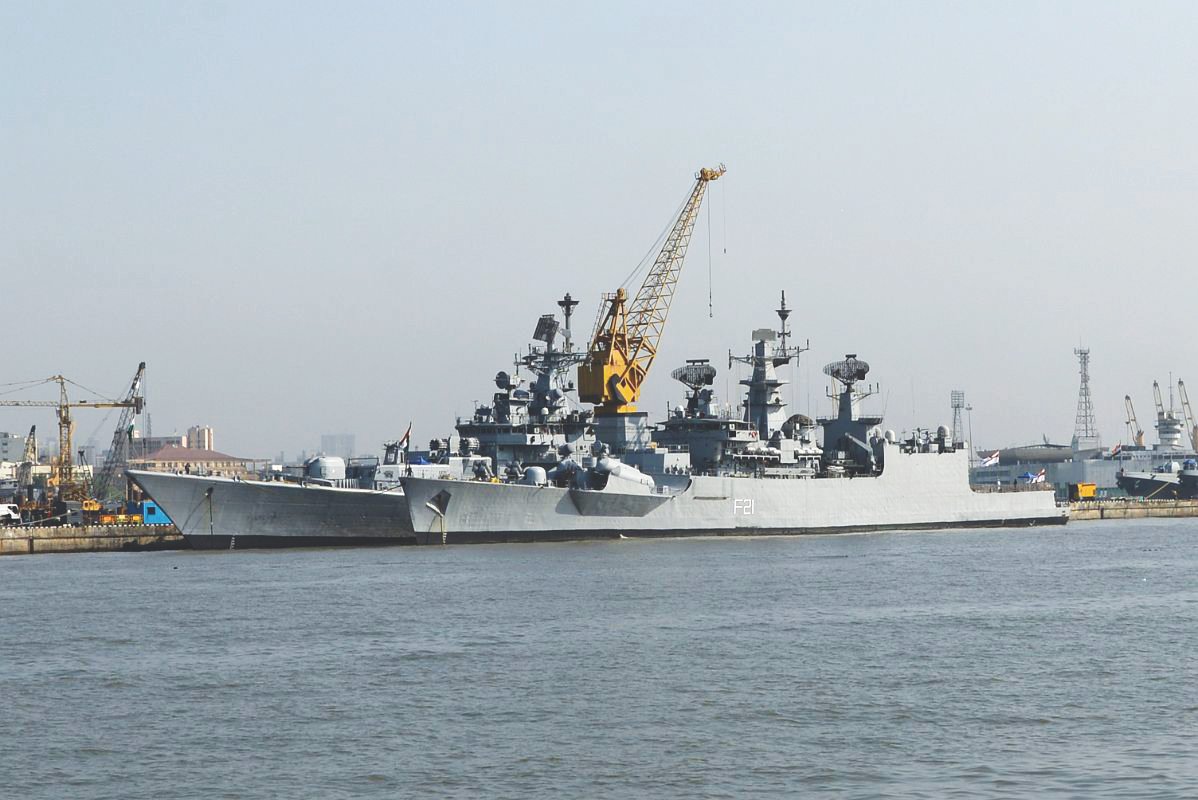
India and the UAE also agreed to conduct a bilateral naval exercise, allowing the Indian Navy for the first time to operate off the shores of Abu Dhabi. “It shows recognition that we have a shared interest in maritime security against piracy, in keeping the sea lanes open, in ensuring the freedom of navigation and perhaps also the recognition of what our forefathers knew: that our countries are neighbours separated only by water,” said Navdeep Suri.
As a part of the Comprehensive Strategic Partnership and to further strengthen defence cooperation between India and the UAE, two ships of the Indian Navy, INS Gomati (Guided Missile Frigate) and INS Kolkata (Guided Missile Destroyer) took part in the maiden Bilateral Exercise Gulf Star 1 from March 17 – 22 this year. The ships arrived at Port Zayed, Abu Dhabi on March 17, 2018 for the Harbour phase of the Exercise and participated with UAEN ships for the Sea phase from March 20, 2018.
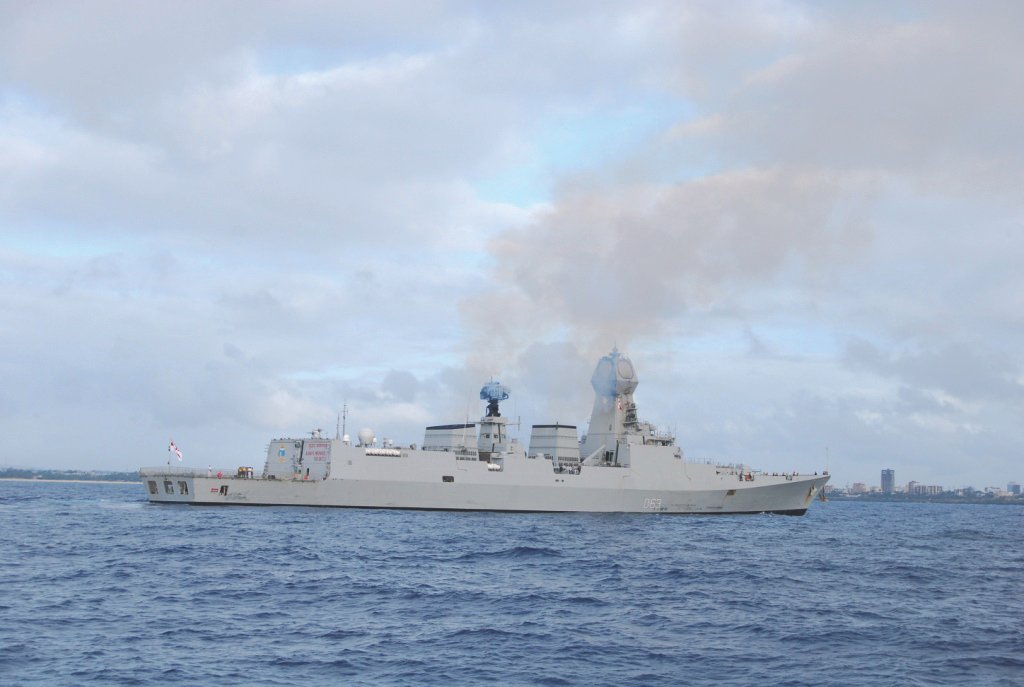
After visiting the ships in Abu Dhabi on March 17, Ambassador Suri said, “I am delighted that the first ever bilateral exercises will soon get underway off the coast of Abu Dhabi. INS Kolkata and INS Gomati have formidable capabilities and the time that they spend with the friendly Naval Forces of UAE will establish a strong platform for us to advance our shared maritime security objectives in the Gulf and the Indian Ocean.”
Both, INS Gomati and INS Kolkata are representatives of India’s capability to construct state-of-the-art indigenous warships capable of undertaking proactive, coordinated combat operations for safeguarding India’s maritime interests.








